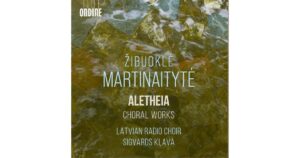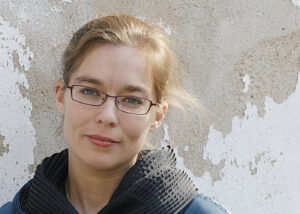Žibuoklė Martinaitytė
Aletheia – Choral Works
Latvian Radio Choir, Sigvards Kļava, artistic director and conductor
Ondine
Žibuoklė Martinaitytė (b. 1973) divides her time between her home country, Lithuania, and the United States. Her works have earned her accolades and laurels such as the Guggenheim Fellowship and a residency and commission from Aaron Copland House. She is well known for exquisitely constructed and powerfully scored orchestral music. On Aletheia, a different side of Martinaitytė’s music is shown; her music for a cappella mixed chorus. None of the pieces programmed on the recording use conventional texts, instead exploring a number of wordless approaches to singing.
Martinaitytė may not be using textual narrative, but the sounds she uses are equally communicative. The title work was written shortly after Russia’s invasion of Ukraine in 2022. Built entirely out of vowels, its stacked harmonies and arcing glissandos suggest a mournful demeanor entirely in keeping with the subject matter. The composer’s harmonies move between cluster chords and deftly tuned overtones, with a gradual development of greater individuation of the parts and faster rhythmic cycling. The piece’s climax is an enormous yawp, followed by a precipitous descent in all of the voices.
Chant des Voyelles (2018) has an interesting genesis. Initially, Martinaitytė selected disparate texts to set, then decided to use just vowels from the text. At this point, she realized that she needn’t be so proscriptive, and decided to construct the piece based on vowels of her own choosing. An intricate web of harmonies and sustained lines, sung with pristine tuning by the Latvian Radio Choir, conducted by Sigvards Kļava, Chant des Voyelles is a luscious work that doesn’t require a program in order to make a strong emotional impression. Ululations (2023) uses the title technique to create a piece filled with varying speeds and types of keening. Rather than a specific topic, Ululations expresses grief for the violence, suffering, and separation occurring throughout the world in current times.
The recording concludes with The Blue of Distance (2010). The title is taken from a quote in Rebecca Solnit’s book A Field Guide to Getting Lost. Martinaitytė’s first textless piece, it is composed entirely of phonemes, whose variety engenders a number of vowel spaces that score the voices with a host of colors. So too the gestures found here, which range from held overtones to strongly punctuated utterances. Partway through, minor second oscillations in the soprano pile up into a blur, a reminiscence of Solnit’s “blue of distance,” but in the audible rather than visual domain.
Martinaitytė is moving into mid-career with a number of durable pieces in her oeuvre. Given the theatricality she can bring to textless vocal music, one wonders what she might do with a fresh libretto; her only stage work, to date, Steppenwolf, is over twenty years old. Regardless, her next compositions are eagerly awaited. Aletheia is one of my favorite recordings of 2024.
Christian Carey


